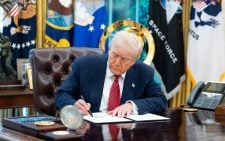Why climate action experts remain uneasy of Trump II

Climate change-sceptic Donald Trump will tonight be sworn in as the 47th President of the United States of America, his second presidency. Many experts warn that his second stint at the White House will be a major setback for climate action.
Trump has already said that he plans to withdraw from Paris Agreement, the legally binding United Nations treaty on climate change, and may even pull the United States out of the UN Framework Convention on Climate Change (UNFCC), which underpins global action to tackle climate change.
Trump has also promised to halt federal climate action and repeal outgoing President Joe Biden’s Inflation Reduction Act, which provides unprecedented spending for clean energy.
The stakes are even higher this time for climate, not only in the US, but globally. The market momentum for renewables and efforts by states and cities may be the only hope for US climate progress.
“The November 5 election was the worst-case outcome for climate regulation. The return of Donald Trump to the Oval Office and Republican control of the Senate and House of Representatives will halt federal progress and lead to a reversal of the climate initiatives undertaken by the Biden administration,” wrote Michael Gerrard in Yale Environment 360.
However, some experts say momentum is now on the side of the energy transition despite any actions Trump will take.
“The result from the election was seen as a major blow to global climate action,” said former UN climate chief Christiana Figueres, “But it cannot and will not halt the changes underway to decarbonise the economy and meet the goals of the Paris Agreement”.
Fight back
Global economics have changed significantly since Trump was last president, according to Stientje van Veldhoven, regional director for Europe at the World Resources Institute and former environment minister of the Netherlands.
“Whereas eight years ago, the economics worked against (the clean energy transition), now they very much start to work in favour of it. That is one thing that has really changed,” she argues.
Writing in the latest edition of the authoritative UK-based Climate Home News, Matteo Civillini, Megan Rowling and Joe Lo took a bleak view of Trump’s second coming:
“With days short, and New Year’s resolutions already in peril, many of us could do with some good news this Monday. Instead, a man who refuses to take global warming seriously, even as Los Angeles burns, will be sworn in as US President, in front of an audience of his climate-denying allies from around the world,” they lamented.
To look away is tempting but of no use to the victims of climate change, experts have opined what Trump’s presidency could mean for the country’s role in international climate agreements, for domestic oil, gas drilling, clean energy spending and for foreign finance.
In his second term, Trump is likely to go after climate science again, but Climate Home found Rachel Cleetus, from the aptly-named Union of Concerned scientists in fight-back mood.
“The United States is still a democracy. There are public interests that will come forward in different kinds of ways,” she said, insisting that they will not concede that the destruction will be complete.
As the notorious climate change-sceptic steps back into the White House, the climate world – from officials to campaigners and business executives – is bracing for the impact of the return of his presidency.
Trump, a Republican business mogul who has called climate change a “scam”, has made no secret of his intentions, attacking the scientific research underpinning the knowledge of global warming and the roll-back of key emission-cutting regulations.
His incoming administration could mark a major setback for climate action.
Experts believe one of his first moves after being sworn in would be to pull the US out of the landmark global climate agreement. If he takes that step – something he did last time – the US would join just three other countries outside the Paris Agreement: Iran, Libya and Yemen.
The process to leave would take a year from the time Trump triggers it, meaning that the US will still be part of the Paris Agreement when the UN Climate Change Conference (COP30) talks take place in Belem, Brazil in November.
‘Trump-proofing’ finance
Trump’s team is also reportedly mulling a more audacious attempt to pull the US out of the UNFCC, the scientific instrument underpinning global climate action, for the first time.
While leaving the Paris pact would be legally straightforward, experts are divided on whether Trump could withdraw the US from the UNFCC without Senate approval and – if he did – how easy it would be for a future president to re-join.
Leaving the Paris pact would mean the US would no longer have to report on its greenhouse gas emissions each year and would have weaker legal responsibilities to provide climate finance for developing countries.
Joe Thwaites, senior advocate for international climate finance with the US-based Natural Resources Defence Council, told Climate Home that Trump’s administration is expected to try to cut back on international climate finance provision everywhere it can – but that doesn’t mean funding will fall to zero. Developing-world climate dollars are at risk, though.
Early in the first term in 2017, when Trump announced that the US would leave the Paris Agreement, he launched a blistering attack on the UN’s Green Climate Fund (GCF) – which was littered with inaccuracies – and refused to deliver any more of a US$3-billion package to the fund made by his predecessor Barack Obama.
The US seems unlikely to stump up the US$4 billion it now owes to the GCF under Trump, after the Biden administration made another large promise. But some international climate finance may be forthcoming if Congress continues approving money for organisations like the US Agency for International Development (USAid) and the Global Environment Facility (GEF), which back climate projects overseas.
“It’s not just what Trump wants – and last time around – we saw that a lot… he didn’t get his way,” Thwaites argues.
Campaigners are planning to Trump-proof climate finance. International climate finance allocations added up to $600 million a year when Trump was previously in office. That’s a far cry from the roughly $11 billion a year provided by the end of Biden’s government, but advocates again plan to push hard to ensure the taps are not turned off.
According to Thwaites international climate finance “is a vital investment”, there’s “still a strong case, including a very self-interested case for why the US would want to carry on providing this kind of finance and geopolitically important partners such as small island developing states are likely to keep on asking for it as a priority.
In addition, the world is now better prepared for a climate-sceptic US president, he notes, compared with the shock of 2016.
“People have priced in Trump’s impact,” he says.
This was reflected at the COP29 climate talks in Baku, Azerbaijan, when the deal on a new finance goal to channel money to developing countries reflected the likelihood of Washington not playing ball for the next four years in terms of its size and composition.
For example, the decision to allow all finance coming via multilateral banks to be counted towards the goal to provide government finance of US$300 billion a year by 2035 means that contributions made by the US can be included in the total, even if it pulls out of the Paris pact.
Wealthier emerging economies like China are encouraged to make voluntary contributions, which could help make up any shortfall due to the US.
Domestically, under Biden, the Export-Import (EXIM) Bank continued to support both renewable energy (including mining for minerals like lithium needed for the energy transition) and fossil fuel projects in countries like Bahrain, and that is unlikely to change under Trump.
Fossil fuels are also expected to get a boost on the domestic front. Under his refrain of “drill, baby, drill”, Trump has promised to increase oil and gas extraction in the US, while rolling back many of the landmark climate regulations introduced under Biden aimed at slashing emissions.
“Rolling back regulations would be a lengthy process, so it’s not going to happen on day one, but certainly by the end of his term, he could remove many of the key climate regulations enacted over the past four years,” says Rachel Cleetus, policy director with the climate and energy programme at the Union of Concerned Scientists.











